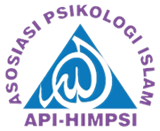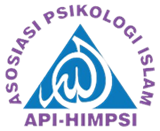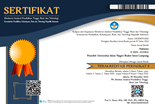A Model Analysis of the Effect of Self-Efficacy, Authoritative Parenting, and Peer Social Support on Academic Stress in Full-Day Senior High School Students
Abstract
This study investigated the influence of self-efficacy, authoritative parenting, and peer social support on academic stress in full-day senior high school students. The population of this study were all twelfth-grade students from Senior High School X in Lampung, with a total of 330 students. This study involved 140 twelfth-grade students as the participants were selected using a cluster random sampling technique. This study employed an academic stress scale, self-efficacy scale, authoritative parenting scale, and peer social support scale. The data was analyzed by evaluating the outer and inner models. The study employed the Structural Equation Model (SEM) for data analysis using the Smart Partial Least Square 3.3.0 application. The findings of this study include the development of a model of the influence of self-efficacy, authoritative parenting, and peer social support on academic stress that is consistent with empirical data, the absence of an effect of self-efficacy on academic stress, a very significant negative influence between authoritative parenting and academic stress, and a very significant negative influence between peer social support and academic stress. The theoretical model developed in this study is a fit model, which can be used as a valid model reference when addressing academic stress.
Keywords
Full Text:
PDFReferences
Agolla, J. E., & Ongori, H. (2009). An assessment of academic stress among undergraduate students: The case of University of Botswana. Educational Research and Reviews, 4(2), 63-70.
Alwisol, (2014). Psikologi Kepribadian. Malang: UMM Press.
Asiamah, D. K. (2013). Examining the effects of parenting styles on academic performance of Senior High School students in the Ejisu-Juaben Municipality, Ashanti Region (Doctoral dissertation).
Baharuddin. (2010). Pendidikan dan psikologi perkembangan. Yogyakarta: Arruzz Media.
Bandura, A. (1997). Self efficacy: The exercise of a control. New York: W. H. Freeman and Company.
Berk, L. E. (2012). Development through the lifespan. Yogyakarta: Pustaka Pelajar
Chambel, M. J., & Curral, L. (2005). Stress in academic life: Work characteristics as predictors of student well‐being and performance. Applied psychology, 54(1), 135-14
Choi, H. J., & Lee, E. J. (2012). Mediation effects of self-efficacy between academic stress and college adjustment in first year nursing students. Journal of Korean academy of fundamentals of nursing, 19(2), 261-268.
Collins, W. A., Maccoby, E. E., Steinberg, L., Hetherington, E. M., & Bornstein, M. H. (2000). Contemporary research on parenting: The case for nature and nurture. American psychologist, 55(2), 218.-232
Desmita. (2011). Psikologi perkembangan peserta didik. Bandung : PT Remaja Rosdakarya.
Ghozalli., & Latan, H. (2015). Partial least squares: Konsep, teknik dan aplikasi menggunakan smartPLS 3.0. Semarang: Universitas Diponegoro.
Glozah, F. N. (2013). Effects of academic stress and perceived social support on the psychological wellbeing of adolescents in Ghana. Open Journal of Medical Psychology, 2(4).
Govaerts, S., & Grégoire, J. (2004). Stressful academic situations: study on appraisal variabels in adolescence. Revue Européenne de Psychologie Appliquée/European Review of Applied Psychology, 54(4), 261-271.
Greenberg, J. S. (2002). Comprehensive stress management. New York: Mc Grew-Hill Inc.
Hair, J. F., Thomas, G., Ringle, C. M., & Sartedt, M. (2016). A primer on partial least squares structural equation modeling (PLS-SEM). California: Sage Publiscations.
Hamrat, N., Hidayat, D. R., & Sumantri, M. S. (2019). Dampak stres akademik dan cyberloafing terhadap kecanduan smartphone. Jurnal EDUCATIO: Jurnal Pendidikan Indonesia, 5(1), 13-19.
Hartono & Abdillah,W.(2009). Partial Least Square (PLS). Andi. Yogyakarta.
Hidayati,D.,Febriana,B.,Setyowati,W.E.,(2023) “Hubungan antara pola asuh orang tua dengan tingkat stress pada siswa SMA” Jurnal Ilmiah Sultan Agung, Maret 2023.
Jácquez, L. F. H. (2016). The Evolution of Academic Self-Efficacy and Academic Stress on the University Students in Mexico. American Journal of Educational Research, 4(7), 556-562.
Jogiyanto. (2011). Konsep dan aplikasi structural equation modeling (SEM) berbasis varian dalam penelitian bisnis. Yogyakarta: Unit Penerbit dan Percetakan STIM YKPN Yogyakarta.
Jun, S., & Choi, E. (2015). Academic stress and Internet addiction from general strain theory framework. Computers in Human Behavior, 49, 282-287.
Khan, A., Hamdan, A. R., Ahmad, R., Mustaffa, M. S., & Mahalle, S. (2016). Problem-solving coping and social support as mediators of academic stress and suicidal ideation among Malaysian and Indian adolescents. Community mental health journal, 52(2), 245-250.
Khalik,M & E (2020) “The Effectiveness Of Full Day School System : The Elementary Students Character Through The Poll-Everywhere App”. Journal Edumaspul vol.4 No.2, page 83-89.
Kinantie, O. A. (2012). Gambaran tingkat stres siswa SMAN 3 Bandung kelas XII menjelang ujian nasional 2012. Students e-Journal, 1(1), 31.
King, L. A. (2017). Psikologi umum. Jakarta: Salemba Humanika.
Kuo, B. C., Soucie, K. M., Huang, S., & Laith, R. (2018). The mediating role of cultural coping behaviours on the relationships between academic stress and positive psychosocial well‐being outcomes. International Journal of Psychology, 53, 27-36.
Lee, J., & Choi, H. (2014). Relationship between perfectionism and academic burnout: Focus on the mediating effect of academic stress and academic procrastination. Journal of the Korea Academia-Industrial cooperation Society, 15(11), 6556-6564.
Lee, Y. W., & Lee, E. S. (2019). The Mediated Effects of Gratitude Disposition and Academic Self-Efficacy between Academic Stress and Adjustment to College of Female College Students. The Journal of the Korea Contents Association, 19(5), 35-47.
Mualifah. (2009). Psycho islamic smart parenting. Jogjakarta: DIVA press.
Mulyadi, S., Rahardjo, W., & Basuki, A. H. (2016). The role of parent-child relationship, self-esteem, academic self-efficacy to academic stress. Procedia-Social and Behavioral Sciences, 217, 603-608.
Namira, R. (2018). Hubungan antara self efficacy dengan stres akademik pada remaja SMA DI Yogyakarta.
Nuraini, Q. (2018). Pengaruh kecerdasan emosional dan efikasi diri terhadap Stres akademik siswa Full Day School SMPIT Insan Permata Malang (Doctoral dissertation, Universitas Islam Negeri Maulana Malik Ibrahim).
Ningsih, P.O, & Hidayat, M.T (2022) “Dampak Pelaksanaan Full Day School Terhadap Perkembangan Sosial Anak Di Sekolah”Journal Basicedu vol. 6 No 3 Hal. 4582-4590
Odongo, A. A., Aloka, P. J., & Raburu, P. (2016). Influence of parenting styles on the adolescent students' academic achievement in Kenyan Day Secondary Schools. Journal of Education and Practice, 7(15), 101-108.
Pinugu, J. N. J. (2013). College self-efficacy and academic satisfaction moderated by academic stress. International Journal of Research
Reddy, K. J., Menon, K. R., & Thattil, A. (2018). Academic stress and its sources among University students. Biomedical and Pharmacology Journal, 11(1), 531-537.
Refliandra, R., & Muslimin, Z. I. (2011). Perbedaan tingkat stres antara siswa sekolah dasar yang bersistem full day dan half day. Proyeksi, 6(1), 40-44.
Safiany, A., & Maryatmi, A. S. (2018). Hubungan self efficacy dan dukungan sosial teman sebaya dengan stress akademik pada siswa-siswi kelas XI di SMA 4 Jakarta Pusat. Jurnal Sosial dan Humaniora, 2(3), 87-95.
Salim, Abdul, (2010) “Pengembangan Model Modifikasi Kurikulum Sekolah Inklusif Berbasis Kebutuhan Individu Peserta Didik” Journal Pendidikan dan kebudayaan, vol 16, edisi khusus I.
Sarafino, E. P. & Smith, T. W. (2014). Health psycholology: Biopsychosocial interactions. USA: John Wiley & Sons.
Sarafino, E. P. (2006). Health psychology: Biopsychosocial interactions. Fifth Edition. USA: John Wiley & Sons
Sari, A. K. P., & Falah, I. F. (2018). Perbedaan stress level siswa sekolah dasar antara full-day dan half-day school di kabupaten kuningan. EDUCATOR, 4(2), 142-148.
Schunk, D. H. dan Meece, J. L. (2005). Self-efficacy development in adoloesences. dalam self- efficacy beliefs of adolesences by information age publishing.
Sumiati, E. (2013). Strategy Of achieving quality assurance of full day school in SDIT Ar Rahmah Pacitan (Doctoral dissertation, Universitas Muhammadiyah Surakarta).
Sudiyanto, H, & Ristriyanti,D.,(2021) “Perbedaan Tingkat Stress Pada Siswa Full Day School SDN Kauman 1 Kota Mojokerto Dan Half Day School Tanggunan Kabupaten Mojokerto” Journal medica majapahit Vol 13. No. 2.
Taylor, & Shelley, E. (2003). Health psychology. New york : McGraw-hill.
Takwin,M. (2021) “Kebijakan Sekolah Sehari Penuh (Full Day School) dalam Persepektif Hak Anak” Badamai Law Journal, Vol. 6 Issues 1.
Watson, J. C., & Watson, A. A. (2016). Coping self‐efficacy and academic stress among hispanic first‐year college students: The moderating role of emotional intelligence. Journal of College Counseling, 19(3), 218-230.
Wilks, S. E. (2008). Resilience amid academic stress: The moderating impact of social support among social work students. Advances in social work, 9(2), 106-125.
Wilks, S. E., & Spivey, C. A. (2010). Resilience in undergraduate social work students: Social support and adjustment to academic stress. Social Work Education, 29(3), 276-288.
Yunita, N. T. (2014). Peran Efikasi Diri dan Dukungan Teman Sebaya Terhadap Stres Akademik Pada Remaja Awal.
Yuliani, C.F (2023) “Tingkat Kecemasan Siswa Kelas XII Dalam Menghadapi Ujian Nasional Di SMKN 3 Kota Magelang” Jurnal Ilmu Kesehatan Universitas Safin Pati 15(1).
DOI: http://dx.doi.org/10.24042/00202361688000
Refbacks
- There are currently no refbacks.
Copyright (c) 2023 ANFUSINA: Journal of Psychology













